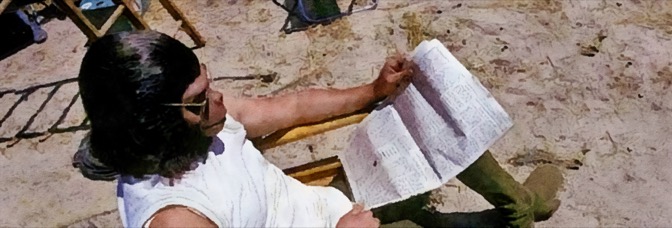I thought the Planet of the Apes festival could use a capstone, since it’s certainly not for sure I’ll make it through enough of Tim Burton’s remake to post about it. And the fiancée has no interest in that one, so it’ll be a while before I get around to it. There are good films to watch before it. I rented Behind the Planet of the Apes a little bit confused about its origins. I remember it (it aired on AMC and I watched some of it), but it’s not in the new Apes box set from Fox, so I figured it was an independent documentary. As it turns out, it is from Fox, which gives it great access to lovely conceptual art (something I can’t ever get enough of), interview subjects, and clips. There are lots of clips. Behind the Planet of the Apes summarizes every one of the movies, spending the most time on the first and then gradually less and less on the other films.
As an actual documentary, Behind is a joke. My review posts of the films make it clear I was never an Apes fan so I really wanted Behind to explain the “phenomenon” to me. It did (the Apes films were intended for kids), but it never went further. Obviously there were audience and critical reactions to these films, but Behind only makes off-hand references. The main force is the summarizing, along with a lengthy look at the production of the first film (but, sadly, nothing on post-production). Had Behind just covered the first film, I imagine it would have been more interesting and a more cohesive experience. The film ends with a brief discussion of Fox’s marketing campaign to tie in with the TV series, but nothing about the producer’s 150 page production idea guide he had for the first film. Because there’s never any substantial reference to the actual impact of these films (the film historian simply advertises the films for Fox), it feels like no one ever saw them before this documentary presented them, twenty-five years later. The producers talk about the cultural impact, but it’s not evident. I don’t expect a lot from a promotional documentary, but it really plays like an infomercial.
All complaints aside, the film does present some diverting information about the making of the films and filmmaking in general. The art director, William Creber has a lot of interesting stuff to talk about and some of the directors have things to say, but they hardly get any screen time. I think the first time I watched it, I hadn’t seen Planet of the Apes in recallable memory, which made it mildly compelling (seeing a bunch of films in summary) and I did remember that factoid about Conquest filming at Century City. However, having just watched all the films, this promotional documentary has brought me no closer to understanding why Apes has such a following. It does nothing to explain what I’m “missing,” which leads me to wonder if I’m not missing anything….

Leave a Reply